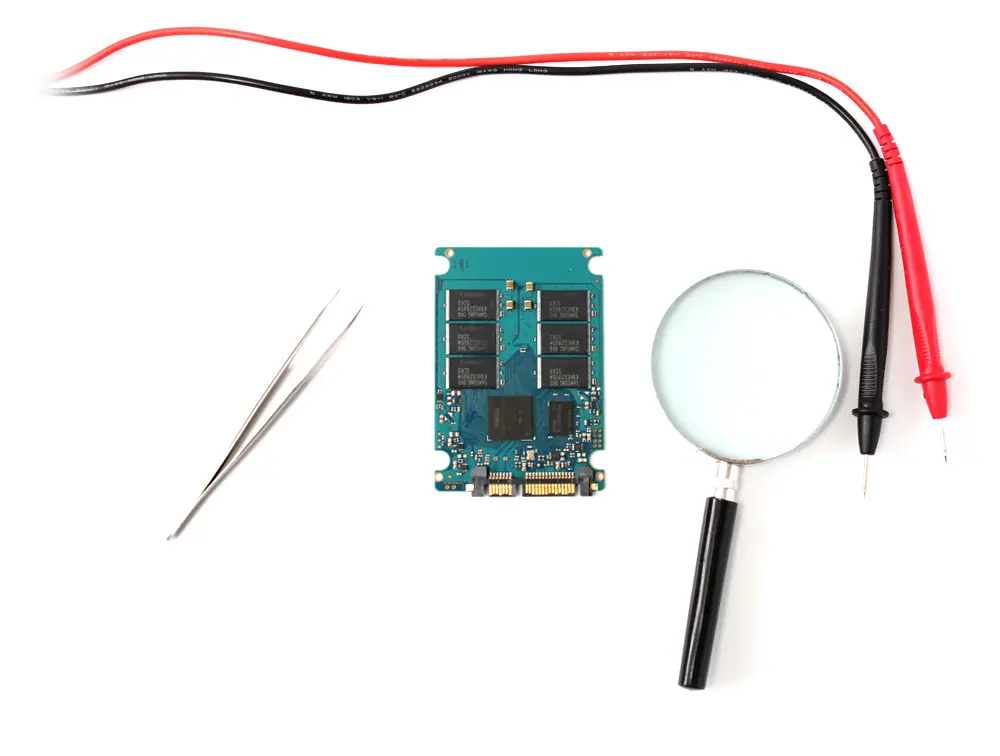SSD Data Recovery Services

Are you looking for a reliable data recovery service to recover your lost data from an SSD? Your search for an expert in SSD data recovery services ends here! Platinum Data Recovery is the name you can trust to recover your lost data from a failed solid-state drive.
Table of contents
Why choose us?
Our certifications








Things you need to know
Data recovery from SSDs is highly complicated. This is because SSD recoveries require special knowledge to avoid further damage and data loss.
Our team is experienced in full data recovery from all types of data loss on SSDs. These drives usually fail without showing any signs and symptoms of damage.
Unlike hard disk drives that have an identical make, SSDs and flash present unique and different makes, which poses a challenge for SSD recovery. Thus, when you need a dependable solid-state drive data recovery expert, Platinum Data Recovery can help.

FAQ
When it comes to traditional hard drives, bad blocks indicate a sign of potential drive failure. However, SSDs work on flash technology and it’s normal for SSDs to have some bad blocks. If the number of bad blocks on your SSD does not change, there is nothing to worry about. Your SSD will continue to work well because its firmware will keep tracking bad blocks and mark them as unusable. On the internet you can find that some IT professionals suggesting running ChkDsk, but we highly do not recommending do it without prior backup of your data. ChkDsk can lead to structure or file corruption. If you notice unusual behavior from your SSD, then contact data recovery professionals for assistance.
As compared to HDDs, solid-state drives are less prone to damage and data loss. However, this doesn’t mean that SSDs are failure-proof. To check if your SSD is failing or about to die, you need to watch out for potential signs of failure. The symptoms of impending SSD failure are frequent crashes during startup, read-only error, slow data transfer, inability to read some data, corrupted data, an increasing number of bad blocks, and more.
Whether your SSD is physically broken or has suffered logical damage, Platinum Data Recovery can try retrieve lost data from SSDs of all makes and models.
Trusted by






What is an SSD?
An SSD (solid-state drive) is a type of nonvolatile storage media that stores data on solid-state flash memory. It uses NAND flash memory to access data and has no moving parts. These drives are more shock resistant and are commonly used in tablets, laptops, and desktop computers.
Compared to hard disk drives, solid-state storage devices have no moving parts. This is an emerging storage technology that promises lower rates of failure compared to other forms of storage media. However, just like any other form of data storage, these advanced drives still fail.
SSDs are more reliable over time because they are less susceptible to physical shock and have no moving parts. However, firmware corruptions, accidental deletion of files, software errors, and other unexpected occurrences are bound to happen. Some common failure types with SSD drives include:
- Electronic component failure
- Controller chip failure
- Flash cell degradation from natural use
- Power surges or failures
- Accidental file deletion
- Damage from viruses
- Damage to printed circuit boards
- Damage to connectors
- Data corruption after firmware updates
Physical SSD failure
In most cases, physical errors in SSDs are related to an electrical problem such as an incorrect power supply, a power surge, or some other electrical error. Another very common problem for SSDs is a damaged controller chip. A physical data recovery solution must be applied which includes repairing the device to a usable state, and the use of state-of-the-art technology and analytical equipment in order to properly extract the data for secure storage onto a working device.
SSD data recovery for physical failures can be related to direct damage to the device such as compressing it, extreme temperatures or humidity, or exposing the device to contaminates such as water, beverages, food items, dirt, and other debris.

Logical SSD failure
Logical failures of SSD drives are uncommon but not impossible. SSD data recovery may also be required in the event that a user error causes the drive to fail, including the inadvertent admission of a malicious virus, program or malware, or when a user mistakenly deletes valuable information.
Why choose us?
Our experts at Platinum Data Recovery can overcome technical challenges that are unique to SSD and flash technology. Attempting a recovery procedure on your own could result in permanent data loss due to the complexity of these drives. Our engineers have been providing cutting-edge solutions to successfully recover data from all types of solid-state drives. SSDs don’t usually don’t show any warning signs or symptoms of damage. It often just stops working or responding, which means the drive has failed and may result in data loss. While a physical hard drive failure might seem like an easy repair, it is the equivalent of complicated surgery. The components of an SSD are generally quite complex in nature – most are microscopic, and the tools and equipment necessary to bring an SSD data recovery project to fruition are expensive, as well as require an expert to wield correctly. Extensive electrical skills are required for a job of this nature.
Platinum Data Recovery engineers have the expertise to deal with the complexity of these drives and have experience in recovery procedures of SSDs from different manufacturers. We have developed strategic and technical relationships with prominent SSD and component manufacturers, which enable our engineers to recover lost data from SSD and flash devices.
In many cases, we can diagnose your device and recover lost data in as little as a few days. The sooner you call us, the sooner your valuable data will be back safely in your possession.
Take action and call us now.
Call (800) 313-0044 or (323) 347-4444
